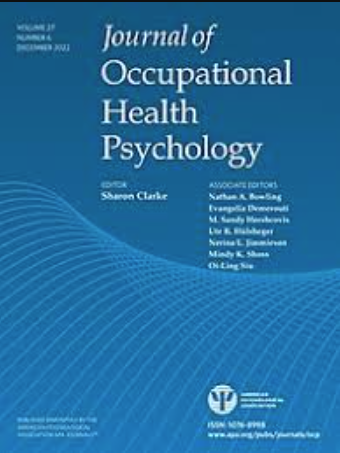远离粗鲁的电子邮件:日常主动和被动电子邮件失礼行为对员工网络闲逛的影响。
IF 3.9
1区 心理学
Q1 PSYCHOLOGY, APPLIED
引用次数: 9
摘要
信息通信技术(如电脑、智能手机和互联网)的日益普及,使得电子邮件不文明和网络闲逛的经历在工作场所更加普遍。在本研究中,我们研究了在工作中经历电子邮件不文明如何积极预测员工的网络闲逛。基于情感事件理论,我们考察了负性情绪作为中介,特质预防焦点和日常工作量作为调节因子。通过对113名全职员工在10个工作日内每天收集两次的日常日记数据,我们发现,上午被动的电子邮件失礼行为可以通过中午的负面情绪积极预测下午的网络闲逛,而上午主动的电子邮件失礼行为则没有。此外,特质预防焦点显著调节了主动电子邮件不礼貌与消极情绪的关系,日常工作量显著调节了被动电子邮件不礼貌与消极情绪的关系。本研究的结果有助于更深入地了解员工的负面体验如何影响他们在虚拟世界中的越轨行为。(PsycInfo Database Record (c) 2022 APA,版权所有)。本文章由计算机程序翻译,如有差异,请以英文原文为准。
Browsing away from rude emails: Effects of daily active and passive email incivility on employee cyberloafing.
The increasing prevalence of information communication technologies (e.g., computers, smartphones, and the internet) has made the experience of email incivility and the engagement in cyberloafing more common in the workplace. In this present study, we examined how experiencing email incivility at work can positively predict employees' cyberloafing. Based on affective events theory, we examined negative emotions as a mediator and trait prevention focus and daily workload as moderators. With daily diary data collected twice per day over 10 workdays from 113 full-time employees, we found that morning passive email incivility positively predicted afternoon cyberloafing via midday negative emotions while morning active email incivility did not. Further, trait prevention focus significantly moderated the relationship between active email incivility and negative emotions while daily workload significantly moderated the relationship between passive email incivility and negative emotions. The findings of the present study contribute to a deeper understanding of how employees' negative experiences affect their deviant behaviors in the virtual world. (PsycInfo Database Record (c) 2022 APA, all rights reserved).
求助全文
通过发布文献求助,成功后即可免费获取论文全文。
去求助
来源期刊
CiteScore
8.20
自引率
5.90%
发文量
46
期刊介绍:
Journal of Occupational Health Psychology offers research, theory, and public policy articles in occupational health psychology, an interdisciplinary field representing a broad range of backgrounds, interests, and specializations. Occupational health psychology concerns the application of psychology to improving the quality of work life and to protecting and promoting the safety, health, and well-being of workers. This journal focuses on the work environment, the individual, and the work-family interface.

 求助内容:
求助内容: 应助结果提醒方式:
应助结果提醒方式:


